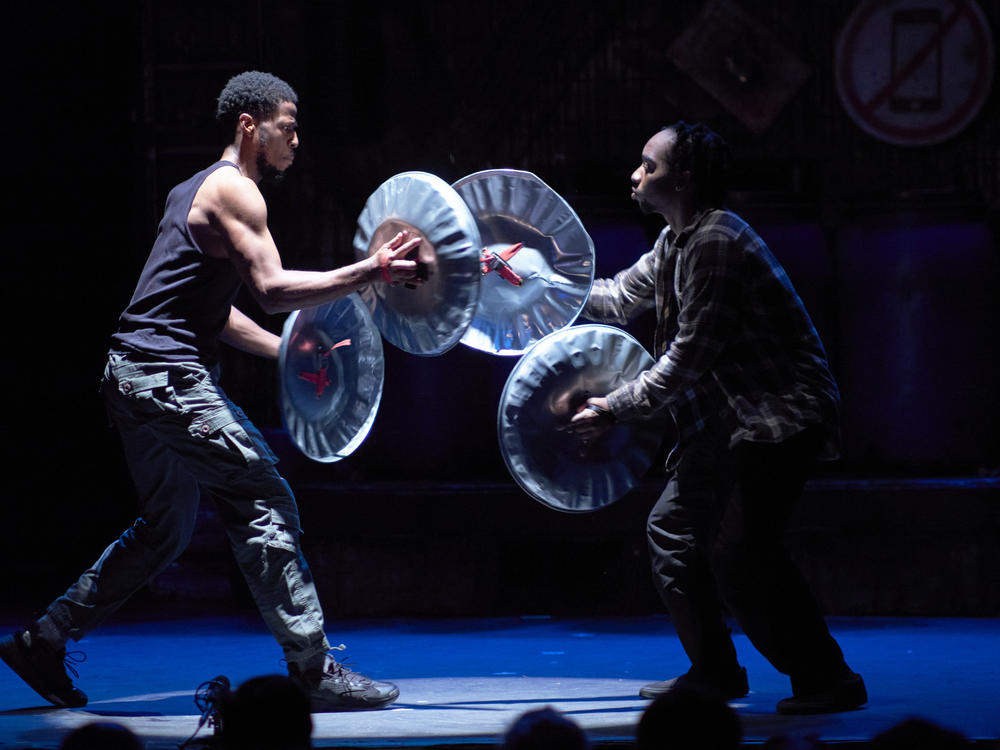Section Branding
Header Content
STOMP closes after 29-year New York run
Primary Content
The choreographic clatter of trash can lids, thud of boot heels and swish of brooms that has been synonymous with New York's downtown performing arts scene for nearly three decades is coming to an end this week. Its final performance is Sunday.
"Twenty-nine years is a long time to sustain a run," STOMP co-producer and general manager Richard Frankel said. "Foreign tourists became a major part of our audience and they really have not returned to New York since COVID. It's been tough. We just aren't selling enough tickets."
But that doesn't mean STOMP is going away. Over the course of its run, it's become an international phenomenon, playing in 45 countries. Its performers made appearances on Sesame Street and at the 2012 Olympic Games. It's been spoofed on The Simpsons. And it has sprouted multiple companies – as many as six at one time.
Though the long-running London production of STOMP closed down in 2018, the producers said both the North American and European tours still do good business, and will continue for the foreseeable future. "We just had a sellout, five-week run in Paris," said STOMP co-founder Steve McNicholas.
From the Streets to the Fringe
STOMP, which is wordless, has its roots in the 1980s United Kingdom street-performance scene. McNicholas, together with co-creator Luke Cresswell, used their bodies and everyday objects to demonstrate the power of rhythm; when they brought their performance to the Edinburgh Fringe Festival in 1991, it caught the attention of producers. Tours in Australia and Canada followed.
When Frankel and his partners saw STOMP in Toronto two years later, they decided to find it a home in New York at the 347-seat Orpheum theatre.
"STOMP is a group of street performers banging stuff. It really captured the sensibility of the East Village in the 1990s," said producer Frankel.
Co-founder McNicholas said New York has been the heart of the STOMP universe. The city has not only hosted nearly 11,500 performances of the show, it's also where the company has held most of its auditions. A company spokesperson said the future location of touring company auditions is yet to be determined.
Any show that's run for almost three decades — and there aren't many of them — have performers and production staff who come over time to see the cast as family. That's literally the case for Fiona Mills, who has now been with the company for more than 30 years. As a longtime performer with STOMP and rehearsal director, she first met her husband Jason Mills when she auditioned him back in the mid-1990s. She's devastated about the New York production's closure.
"It feels like someone just chopped off my arm," she said. "Like part of my identity has just been taken away."
Over the years, the show has collected super-fans, and they also feel bereft. New York-based songwriter and music producer Bowlegged Lou – that's his stage name – said he's seen the show 225 times since the late 1990s.
"It's been a staple in New York City for so long – the downtown equivalent of the Statue of Liberty, the Empire State Building, and Central Park," he said.
But still, he's excited to see it one last time: Sunday's finale will be his 226th performance. "After that," he said, "I'll have to see the show on tour."
Copyright 2023 NPR. To see more, visit https://www.npr.org.

